Related Research Articles

The Russian Orthodox Church, alternatively legally known as the Moscow Patriarchate, is an autocephalous Eastern Orthodox Christian church. It has 194 dioceses inside Russia. The primate of the ROC is the Patriarch of Moscow and all Rus'.

Bartholomew I is the 270th archbishop of Constantinople and Ecumenical Patriarch, since 2 November 1991. In accordance with his title, he is regarded as the primus inter pares in the Eastern Orthodox Church, and as the spiritual leader of the Eastern Orthodox Christians worldwide.

The history of Christianity in Ukraine dates back to the earliest centuries of the history of Christianity, to the Apostolic Age, with mission trips along the Black Sea and a legend of Saint Andrew even ascending the hills of Kyiv. The first Christian community on territory of modern Ukraine is documented as early as the 9th century with establishment of the Metropolitanate of Gothia centered in Crimean peninsula. However, on territory of the Old Rus in Kyiv it became the dominant religion since its official acceptance in 989 by Vladimir the Great, who brought it from Byzantine Crimea and installed it as the state religion of medieval Kyivan Rus (Ruthenia), with the metropolitan see in Kyiv.
Pope John Paul II's relations with the Eastern Orthodox Church were marked by a significant improvement in relations between Roman Catholicism and Eastern Orthodoxy.

The Ukrainian Orthodox Church, commonly referred to as the Ukrainian Orthodox Church of the Moscow Patriarchate, is an Eastern Orthodox church in Ukraine under the disputed jurisdiction of the Russian Orthodox Church. Although the UOC-MP claims that ‘any provisions that at least somehow hinted at or indicated the connection with Moscow were excluded’ the Russian Orthodox Church ignores this and continues to include UOC-MP clerics in various commissions or working groups despite these individuals not agreeing to this.
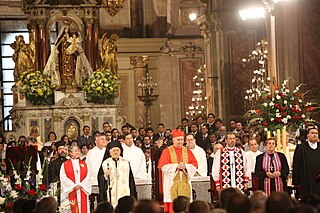
The Catholic Church has engaged in the modern ecumenical movement especially since the Second Vatican Council (1962-1965) and the issuing of the decree Unitatis redintegratio and the declaration Dignitatis humanae. It was at the Council that the Pontifical Council for Promoting Christian Unity was created. Those outside of the Catholic Church were categorised as heretics or schismatics, but in many contexts today, in order to avoid offence, the euphemism "separated brethren" is used.
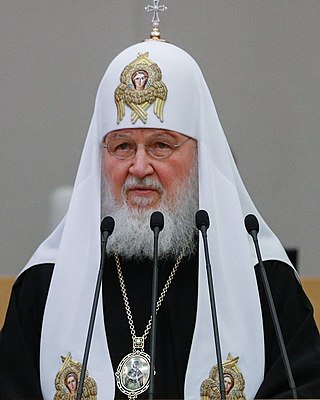
Kirill or Cyril is a Russian Orthodox bishop. He became Patriarch of Moscow and all Rus' and Primate of the Russian Orthodox Church on 1 February 2009.
Religion in Ukraine is diverse, with a majority of the population adhering to some denomination of Christianity. A 2022 survey conducted by the Kyiv International Institute of Sociology (KIIS) reported that 85% of Ukrainians identify themselves as Christians. 72% of the population avowed fidelity to an Eastern Orthodox Church: 54% of Ukrainians proclaimed adherence to the autocephalous Orthodox Church of Ukraine; 14% identified as Orthodox Christian without specifying a church affiliation; 4% associated with the Moscow Patriarchate. Another 9% of Ukrainians professed devotion to the Catholic Church in Ukraine: 8% Ukrainian Greek Catholics and 1% Latin Catholics. 2% of the population declared affiliation to a mainstream Protestant Church, and a further 2% identified with some alternative sect of Christianity.
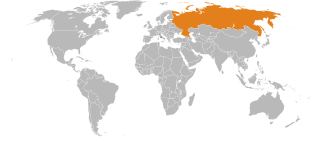
Holy See–Russia relations are the bilateral relations between the Holy See and Russia. The Holy See has an Apostolic Nunciature in Moscow. Russia has a permanent representative to the Holy See based in Rome.
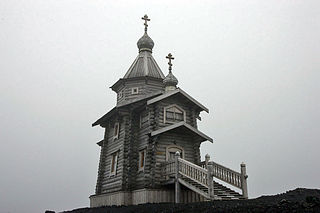
Christianity in the 21st century is characterized by the pursuit of church unity and the continued resistance to persecution and secularization.

Sviatoslav Shevchuk has been the Major Archbishop of the Ukrainian Greek Catholic Church (UGCC) since 25 March 2011, serving as the Eastern Catholic church's leader.

The Joint Declaration of Pope Francis and Patriarch Kirill, also known as the Havana Declaration, was issued following the first meeting in February 2016 between Pope Francis, who, as the Bishop of Rome, is the pontiff of the Catholic Church, and Patriarch Kirill of Moscow, Patriarch of Moscow and all Rus', Patriarch of the Russian Orthodox Church (ROC), the largest of the Eastern Orthodox churches. This was the first time leaders of the Catholic Church and the Moscow Patriarchate had met. While the meeting was also seen as a symbolic moment in the history of relations between the Catholic Church and the Orthodox churches as a community, which had split in the Great Schism of 1054, centuries before the Moscow Patriarchate was constituted, it was not expected to lead to any immediate rapprochement between them.
This is a timeline of the presence of Eastern Orthodoxy in Greece from 2008. The history of Greece traditionally encompasses the study of the Greek people, the areas they ruled historically, as well as the territory now composing the modern state of Greece.

The Russkiy mir, an ambiguous term which may be understood in English both as "Russian world" and as "Russian peace", is the concept of social totality associated with the purported Russian civilization. Russkiy mir as a concept comprises the core Russian culture and is in interaction with the diverse cultures of Russia through traditions, history and the Russian language. It comprises also the Russian diaspora with its influence in the world. The concept is based on the notion of "Russianness", and both have been considered ambiguous. The "Russkiy mir" and awareness of it arose through Russian history and was shaped by its periods.
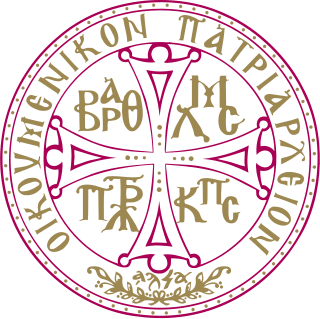
A schism between the Russian Orthodox Church and the Ecumenical Patriarchate of Constantinople began on 15 October 2018 when the former unilaterally severed full communion with the latter.

Metropolitan Epiphaniusof Kyiv and All Ukraine is the primate of the Orthodox Church of Ukraine (OCU), holding the title of Metropolitan of Kyiv and All Ukraine.
On 15 October 2018, the Russian Orthodox Church broke the communion with the Ecumenical Patriarchate because of a dispute concerning the canonical jurisdiction over Ukraine. This led to the 2018 Moscow–Constantinople schism. Numerous Orthodox churches took position concerning the dispute over the canonical jurisdiction over Ukraine, whether before or after this schism.
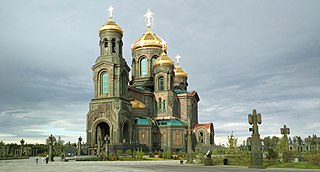
The Main Cathedral of the Russian Armed Forces is a lavish Russian Patriarchal cathedral in honour of the Resurrection of Christ and "dedicated to the 75th anniversary of victory in the Great Patriotic War, as well as the military feats of the Russian people in all wars", built in the Patriot Park in the Odintsovsky District, Moscow Oblast. The cathedral was built with donations and budget funds from the Moscow city government and the Moscow Oblast. It was consecrated as part of the celebration of the 75th anniversary of Soviet victory on the Eastern Front of World War II. An exhibition dedicated to the history of the Russian state and its armed forces will be located on-site.
On 5 January 2023, Patriarch Kirill of Moscow, head of the Russian Orthodox Church, called on both sides of the war in Ukraine for an Eastern Orthodox Christmas truce. On the evening of the same day, Russian President Vladimir Putin instructed Russian Defense Minister Sergei Shoigu to declare a 36-hour temporary ceasefire along the entire line of contact between Russian and Ukrainian troops from midday on 6 January to midnight on 7 to 8 January 2023.
A Declaration on the Russian World teaching, also known as the Volos declaration is a 2022 theological statement issued by the Volos Academy for Theological Studies and signed by more than 1600 theologians and clerics of the Eastern Orthodox Church in opposition to Russian Orthodox teachings following the 2022 Russian invasion of Ukraine.
References
- ↑ Clay, J. Eugene. "Two Orthodox Christian countries at war – here's an explanation of the faith tradition shared by Russia and Ukraine". The Conversation. Retrieved 2023-01-20.
- ↑ Pullella, Philip (2022-03-14). "Analysis: Ukraine invasion splits Orthodox Church, isolates Russian patriarch". Reuters. Retrieved 2023-01-20.
- ↑ Harris, Kayla. "As war rages, some Ukrainians look to Mary for protection – continuing a long Christian tradition". The Conversation. Retrieved 2023-01-20.
- ↑ "The Muslim Reaction to the Ukraine War: From Crimean Tatars to Erdogan". Haaretz. Retrieved 2023-01-20.
- ↑ Kassidiaris, Alex (2022-03-22). "Russia's religious soft power and the war in Ukraine". New Arab. Retrieved 2023-01-20.
- ↑ Olmstead, Molly (2022-03-08). "Can the Christian Right Quit Putin?". Slate Magazine. Retrieved 2023-01-20.
- ↑ "The Role of Religion in Russia's War on Ukraine". United States Institute of Peace. Retrieved 2023-01-20.
- ↑ Kenworthy, Scott. "Why is Russia's church backing Putin's war? Church-state history gives a clue". The Conversation. Retrieved 2023-01-20.
- ↑ Times, The Moscow (2022-03-07). "Russian Church Leader Appears to Blame Gay Pride Parades for Ukraine War". The Moscow Times. Retrieved 2023-01-20.
- ↑ Jenkins, Jack (2022-03-10). "Orthodox priest reportedly arrested in Russia for sermon decrying invasion of Ukraine". Religion News Service. Retrieved 2023-01-20.
- ↑ "Ukraine war: Russians grieve for fallen soldiers". BBC News. 2022-03-17. Retrieved 2023-01-20.
- ↑ "The Use of Religious Arguments for the Justification of the Russian Invasion of Ukraine". Talk About: Law and Religion. 2022-03-18. Retrieved 2023-01-20.
- ↑ "The missing piece about Putin and Ukraine". News. Retrieved 2023-01-20.
- ↑ "Why Putin's invasion of Ukraine is an utterly modern holy war". ABC News. 2022-03-19. Retrieved 2023-01-20.
- ↑ Jenkins, Jack (2022-03-19). "How Putin's invasion became a holy war for Russia". Religion News Service. Retrieved 2023-01-20.
- ↑ "Russia's Invasion of Ukraine: The First Religious War in the 21st Century". Religion and Global Society. 2022-03-03. Retrieved 2023-01-20.
- ↑ "'Key to white survival': how Putin has morphed into a far-right savior". the Guardian. 2022-03-05. Retrieved 2023-01-20.
- ↑ "Putin's Spiritual Destiny". Religion and Global Society. 2022-02-25. Retrieved 2023-01-20.
- ↑ Harned, Lena Surzhko. "Holy wars: How a cathedral of guns and glory symbolizes Putin's Russia". The Conversation. Retrieved 2023-01-20.
- ↑ "The antisemitism animating Putin's claim to 'denazify' Ukraine | Jason Stanley". the Guardian. 2022-02-26. Retrieved 2023-01-20.
- ↑ Silk, Mark (2022-02-28). "Religious nationalism and the invasion of Ukraine". Religion News Service. Retrieved 2023-01-20.
- ↑ Jenkins, Jack (2022-03-04). "Among Russian Orthodox, glimmers of dissent against the invasion of Ukraine". Religion News Service. Retrieved 2023-01-20.
- ↑ Heneghan, Tom (2022-03-14). "Russian Orthodox parishes in Europe pressured from both sides as war rages in Ukraine". Religion News Service. Retrieved 2023-01-20.
- ↑ "Christian Orthodox spiritual leader calls for end of Ukraine war". Reuters. 2022-02-27. Retrieved 2023-01-20.
- ↑ Vorobyov, Niko. "'A catastrophe': Putin's war on Ukraine divides Orthodox church". www.aljazeera.com. Retrieved 2023-01-20.
- ↑ "Russian Orthodox church in Amsterdam announces split with Moscow". the Guardian. 2022-03-13. Retrieved 2023-01-20.
- ↑ "Lithuanian Orthodox Church condemns Russia's war on Ukraine". lrt.lt. 2022-03-18. Retrieved 2023-01-20.
- ↑ Riess, Jana (2022-02-28). "Amid Russian invasion, LDS Church issues generic denunciation of 'armed conflict'". Religion News Service. Retrieved 2023-01-20.
- ↑ Rome, Associated Press in (2022-03-18). "Pope Francis denounces 'abuse of power' in Russia-Ukraine war". the Guardian. Retrieved 2023-01-20.
- ↑ "Pope Francis and Patriarch Kirill discuss Ukraine war for first time". Religion News Service. 2022-03-16. Retrieved 2023-01-20.
- ↑ Giangravé, Claire (2022-03-10). "With war in Ukraine, Pope Francis' yearslong outreach to Kirill appears to be in ruins". Religion News Service. Retrieved 2023-01-20.
- ↑ Friedman, Gabe. "Who are Ukraine's Jews, and how is Russia's invasion affecting them?". www.timesofisrael.com. Retrieved 2023-01-20.
- ↑ Khiterer, Victoria. "Kyiv's Jews, persecuted under Polish-Lithuanian, Russian, Nazi and Soviet regimes, now face the onslaught of Putin's forces". The Conversation. Retrieved 2023-01-20.
- ↑ Ali, Taz (2022-03-20). "Zelensky tells Israel 'our neighbours want us dead' and compares invasion to WW2 atrocities". inews.co.uk. Retrieved 2023-01-20.
- ↑ "How past horrors are pushing Polish Jews to help fleeing Ukrainians". euronews. 2022-03-28. Retrieved 2023-01-20.
- ↑ "'It is terrible': For Ukraine's Jews and Roma, war revives old traumas". BBC News. 2022-03-04. Retrieved 2023-01-20.
- ↑ "Russia Pressures Jewish Leaders to Support Putin's Ukraine War". Haaretz. Retrieved 2023-01-20.
- ↑ "Vandals Attack Homes of Prominent Anti-War Russian Activists". The Moscow Times. 25 March 2022. Retrieved 25 March 2022.
- ↑ Ukraine's woman rabbi jews fleeing war [ dead link ]
- ↑ Hughes, Trevor. "'We are that united family': Russia's war uproots Ukrainian Jews amid false Nazi claims". USA TODAY. Retrieved 2023-01-20.
- ↑ "Ukraine's Jews seek refuge in synagogues as Russia invades". Los Angeles Times. 2022-02-25. Retrieved 2023-01-20.
- ↑ Brugen, Isabel van (Jan 19, 2023). "Russian troops given pep talk with LGBTQ attacks and warnings of Satanism". Newsweek. Retrieved Jan 22, 2023.
- ↑ "Problems, disagreements best resolved through dialogue: Dalai Lama on Ukraine crisis - Times of India". The Times of India. Retrieved Jan 22, 2023.